|
|
|
Sort Order |
|
|
|
Items / Page
|
|
|
|
|
|
|
| Srl | Item |
| 1 |
ID:
116112
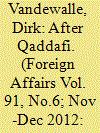

|
|
|
|
|
| Publication |
2012.
|
| Summary/Abstract |
The September 11 killing of the U.S. ambassador to Libya, Christopher Stevens, and three other Americans during an attack by an angry mob on the U.S. consulate in Benghazi has concentrated the world's attention on the problems of post-Qaddafi Libya. The riots showcased both the power of radical Islamist militias and the inability of the government in Tripoli to provide security and maintain order across the country. Lawlessness and corruption are pervasive, and fundamental questions about the structure and operation of Libyan political and economic institutions remain unanswered. None of this, however, should obscure the fact that the larger story about the new Libya is surprisingly positive. The worst-case scenarios commonly predicted a year ago have not emerged, and there are actually grounds for guarded optimism about the future.
|
|
|
|
|
|
|
|
|
|
|
|
|
|
|
|
| 2 |
ID:
116111
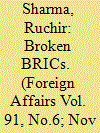

|
|
|
|
|
| Publication |
2012.
|
| Summary/Abstract |
Over the past several years, the most talked-about trend in the global economy has been the so-called rise of the rest, which saw the economies of many developing countries swiftly converging with those of their more developed peers. The primary engines behind this phenomenon were the four major emerging-market countries, known as the BRICs: Brazil, Russia, India, and China. The world was witnessing a once-in-a-lifetime shift, the argument went, in which the major players in the developing world were catching up to or even surpassing their counterparts in the developed world.
|
|
|
|
|
|
|
|
|
|
|
|
|
|
|
|
| 3 |
ID:
116121
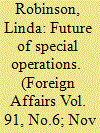

|
|
|
|
|
| Publication |
2012.
|
| Summary/Abstract |
Over the past decade, the United States' military and the country's national security strategy have come to rely on special operations to an unprecedented degree. As identifying and neutralizing terrorists and insurgents has become one of the Pentagon's most crucial tasks, special operations forces have honed their ability to conduct manhunts, adopting a new targeting system known as "find, fix, finish, exploit, analyze, and disseminate." They have adopted a flatter organizational structure and collaborated more closely with intelligence agencies, allowing special operations to move at "the speed of war," in the words of the retired army general Stanley McChrystal, the chief architect of the contemporary U.S. approach to counterterrorism.
|
|
|
|
|
|
|
|
|
|
|
|
|
|
|
|
| 4 |
ID:
116116
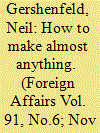

|
|
|
|
|
| Publication |
2012.
|
| Summary/Abstract |
A new digital revolution is coming, this time in fabrication. It draws on the same insights that led to the earlier digitizations of communication and computation, but now what is being programmed is the physical world rather than the virtual one. Digital fabrication will allow individuals to design and produce tangible objects on demand, wherever and whenever they need them. Widespread access to these technologies will challenge traditional models of business, aid, and education.
|
|
|
|
|
|
|
|
|
|
|
|
|
|
|
|
| 5 |
ID:
116120
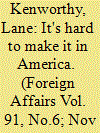

|
|
|
|
|
| Publication |
2012.
|
| Summary/Abstract |
For all the differences between Democrats and Republicans that were laid bare during the 2012 U.S. presidential campaign, the parties' standard-bearers, Barack Obama and Mitt Romney, do seem to have agreed on one thing: the importance of equal opportunity. In remarks in Chicago in August, Obama called for an "America where no matter who you are, no matter what you look like, no matter where you come from, no matter what your last name is, no matter who you love, you can make it here if you try." The same month, he urged the Supreme Court to uphold affirmative action in public universities, putting his weight behind what has been a mainstay of U.S. equal opportunity legislation since the 1960s. Days later, the Republican vice presidential nominee, Paul Ryan, echoed Obama's sentiment, saying, "We promise equal opportunity, not equal outcomes." Romney, too, argued that whereas Obama "wants to turn America into a European-style entitlement society," his administration would "ensure that we remain a free and prosperous land of opportunity."
|
|
|
|
|
|
|
|
|
|
|
|
|
|
|
|
| 6 |
ID:
116115
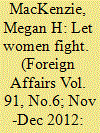

|
|
|
|
|
| Publication |
2012.
|
| Summary/Abstract |
On Wednesday, the U.S. Department of Defense announced that it would lift the ban on women in combat. This landmark decision reverses the 1994 "direct ground combat rule," which held that "women shall be excluded from assignment to units below the brigade level whose primary mission is to engage in direct combat on the ground."
|
|
|
|
|
|
|
|
|
|
|
|
|
|
|
|
| 7 |
ID:
116114


|
|
|
|
|
| Publication |
2012.
|
| Summary/Abstract |
Mexico has long been hostage to unchallengeable traditions: its nationalist approach to oil wealth, overly sensitive attitude toward sovereignty, entrenched labor monopolies, persistent corruption, and self-serving bureaucracy. Acquired over time, these attitudes and practices became cemented in the national soul and embedded in the habits of the government and society, sapping the country's potential.
|
|
|
|
|
|
|
|
|
|
|
|
|
|
|
|
| 8 |
ID:
116118
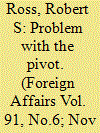

|
|
|
|
|
| Publication |
2012.
|
| Summary/Abstract |
Ever since the Chinese leader Deng Xiaoping opened up his country's economy in the late 1970s, China has managed to grow in power, wealth, and military might while still maintaining cooperative and friendly relations with most of the world. Until a few years ago, that is, when Beijing seemed to change tack, behaving in a way that alienated its neighbors and aroused suspicion abroad. In December 2009, for example, Beijing's resistance to compromise at the UN Climate Change Conference angered European countries and the United States.
|
|
|
|
|
|
|
|
|
|
|
|
|
|
|
|
| 9 |
ID:
116119


|
|
|
|
|
| Publication |
2012.
|
| Summary/Abstract |
Last winter, a wave of mass demonstrations suddenly broke the surface calm of Russian politics. A new middle class, born of the oil-based prosperity of the last decade, took to the streets to voice its opposition to the perceived corruption of the political elite, especially United Russia, the ruling party of then Prime Minister Vladimir Putin. For a time, as the protest movement gained momentum, the very foundations of the regime appeared to shake. But in the March 2012 presidential election, Putin managed to win comfortably in the first round, and despite widespread charges of manipulation, even the opposition conceded that he had earned a convincing victory.
|
|
|
|
|
|
|
|
|
|
|
|
|
|
|
|
| 10 |
ID:
116113


|
|
|
|
|
| Publication |
2012.
|
| Summary/Abstract |
The mood in Erbil, Sulaymaniyah, and Dohuk -- the three largest cities in Iraqi Kurdistan -- is newly buoyant these days, and with good reason. Iraq's Kurds, who occupy the semiautonomous region run by the Kurdistan Regional Government (KRG), have much to celebrate. They enjoy relative peace and stability compared with the rest of the country, boast a moderately open society, and, over the past year, have received a whopping vote of confidence in their nascent economy from some of the world's largest oil companies, including ExxonMobil, Chevron, Total, and Gazprom, all of which have signed exploration contracts with the KRG. Not only is Iraqi Kurdistan undergoing an unprecedented building boom, but its people are now articulating a once-unthinkable notion: that the day they will break free from the rest of Iraq is nigh.
|
|
|
|
|
|
|
|
|
|
|
|
|
|
|
|
| 11 |
ID:
116117
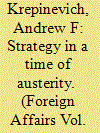

|
|
|
|
|
| Publication |
2012.
|
| Summary/Abstract |
Over the next decade, the U.S. military will need to undertake the most dramatic shift in its strategy since the introduction of nuclear weapons more than 60 years ago. Just as defense budgets are declining, the price of projecting and sustaining military power is increasing and the range of interests requiring protection is expanding. This means that tough strategic choices will finally have to be made, not just talked about. As the British physicist Ernest Rutherford once declared to his colleagues, "We haven't got the money, so we've got to think."
|
|
|
|
|
|
|
|
|
|
|
|
|
|
|
|
|
|
|
|
|